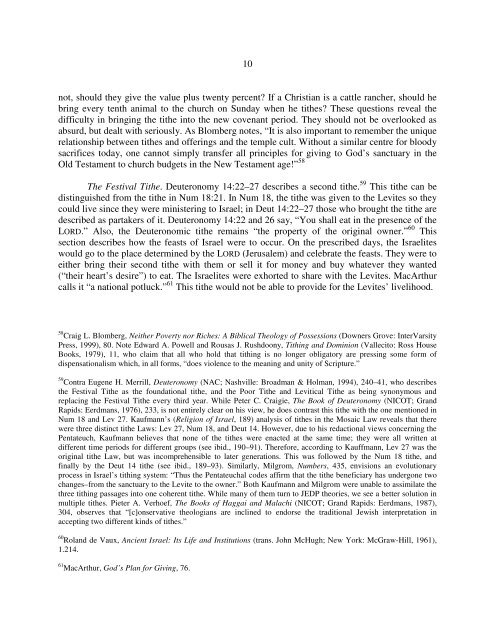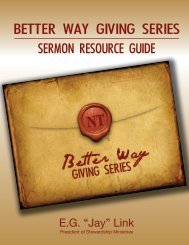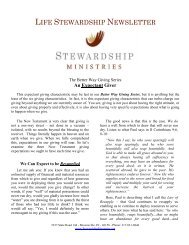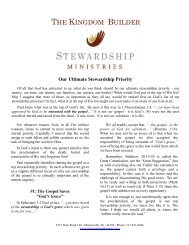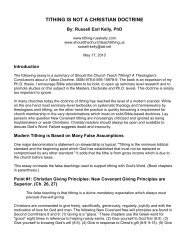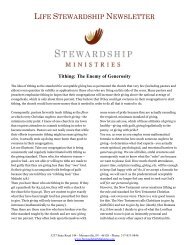âWill a Man Rob God?â (Malachi 3:8) - Biblical Foundations
âWill a Man Rob God?â (Malachi 3:8) - Biblical Foundations
âWill a Man Rob God?â (Malachi 3:8) - Biblical Foundations
You also want an ePaper? Increase the reach of your titles
YUMPU automatically turns print PDFs into web optimized ePapers that Google loves.
10<br />
not, should they give the value plus twenty percent? If a Christian is a cattle rancher, should he<br />
bring every tenth animal to the church on Sunday when he tithes? These questions reveal the<br />
difficulty in bringing the tithe into the new covenant period. They should not be overlooked as<br />
absurd, but dealt with seriously. As Blomberg notes, “It is also important to remember the unique<br />
relationship between tithes and offerings and the temple cult. Without a similar centre for bloody<br />
sacrifices today, one cannot simply transfer all principles for giving to <strong>God</strong>’s sanctuary in the<br />
Old Testament to church budgets in the New Testament age!” 58<br />
The Festival Tithe. Deuteronomy 14:22–27 describes a second tithe. 59 This tithe can be<br />
distinguished from the tithe in Num 18:21. In Num 18, the tithe was given to the Levites so they<br />
could live since they were ministering to Israel; in Deut 14:22–27 those who brought the tithe are<br />
described as partakers of it. Deuteronomy 14:22 and 26 say, “You shall eat in the presence of the<br />
LORD.” Also, the Deuteronomic tithe remains “the property of the original owner.” 60 This<br />
section describes how the feasts of Israel were to occur. On the prescribed days, the Israelites<br />
would go to the place determined by the LORD (Jerusalem) and celebrate the feasts. They were to<br />
either bring their second tithe with them or sell it for money and buy whatever they wanted<br />
(“their heart’s desire”) to eat. The Israelites were exhorted to share with the Levites. MacArthur<br />
calls it “a national potluck.” 61 This tithe would not be able to provide for the Levites’ livelihood.<br />
58 Craig L. Blomberg, Neither Poverty nor Riches: A <strong>Biblical</strong> Theology of Possessions (Downers Grove: InterVarsity<br />
Press, 1999), 80. Note Edward A. Powell and Rousas J. Rushdoony, Tithing and Dominion (Vallecito: Ross House<br />
Books, 1979), 11, who claim that all who hold that tithing is no longer obligatory are pressing some form of<br />
dispensationalism which, in all forms, “does violence to the meaning and unity of Scripture.”<br />
59 Contra Eugene H. Merrill, Deuteronomy (NAC; Nashville: Broadman & Holman, 1994), 240–41, who describes<br />
the Festival Tithe as the foundational tithe, and the Poor Tithe and Levitical Tithe as being synonymous and<br />
replacing the Festival Tithe every third year. While Peter C. Craigie, The Book of Deuteronomy (NICOT; Grand<br />
Rapids: Eerdmans, 1976), 233, is not entirely clear on his view, he does contrast this tithe with the one mentioned in<br />
Num 18 and Lev 27. Kaufmann’s (Religion of Israel, 189) analysis of tithes in the Mosaic Law reveals that there<br />
were three distinct tithe Laws: Lev 27, Num 18, and Deut 14. However, due to his redactional views concerning the<br />
Pentateuch, Kaufmann believes that none of the tithes were enacted at the same time; they were all written at<br />
different time periods for different groups (see ibid., 190–91). Therefore, according to Kauffmann, Lev 27 was the<br />
original tithe Law, but was incomprehensible to later generations. This was followed by the Num 18 tithe, and<br />
finally by the Deut 14 tithe (see ibid., 189–93). Similarly, Milgrom, Numbers, 435, envisions an evolutionary<br />
process in Israel’s tithing system: “Thus the Pentateuchal codes affirm that the tithe beneficiary has undergone two<br />
changes–from the sanctuary to the Levite to the owner.” Both Kaufmann and Milgrom were unable to assimilate the<br />
three tithing passages into one coherent tithe. While many of them turn to JEDP theories, we see a better solution in<br />
multiple tithes. Pieter A. Verhoef, The Books of Haggai and <strong>Malachi</strong> (NICOT; Grand Rapids: Eerdmans, 1987),<br />
304, observes that “[c]onservative theologians are inclined to endorse the traditional Jewish interpretation in<br />
accepting two different kinds of tithes.”<br />
60 Roland de Vaux, Ancient Israel: Its Life and Institutions (trans. John McHugh; New York: McGraw-Hill, 1961),<br />
1.214.<br />
61 MacArthur, <strong>God</strong>’s Plan for Giving, 76.


